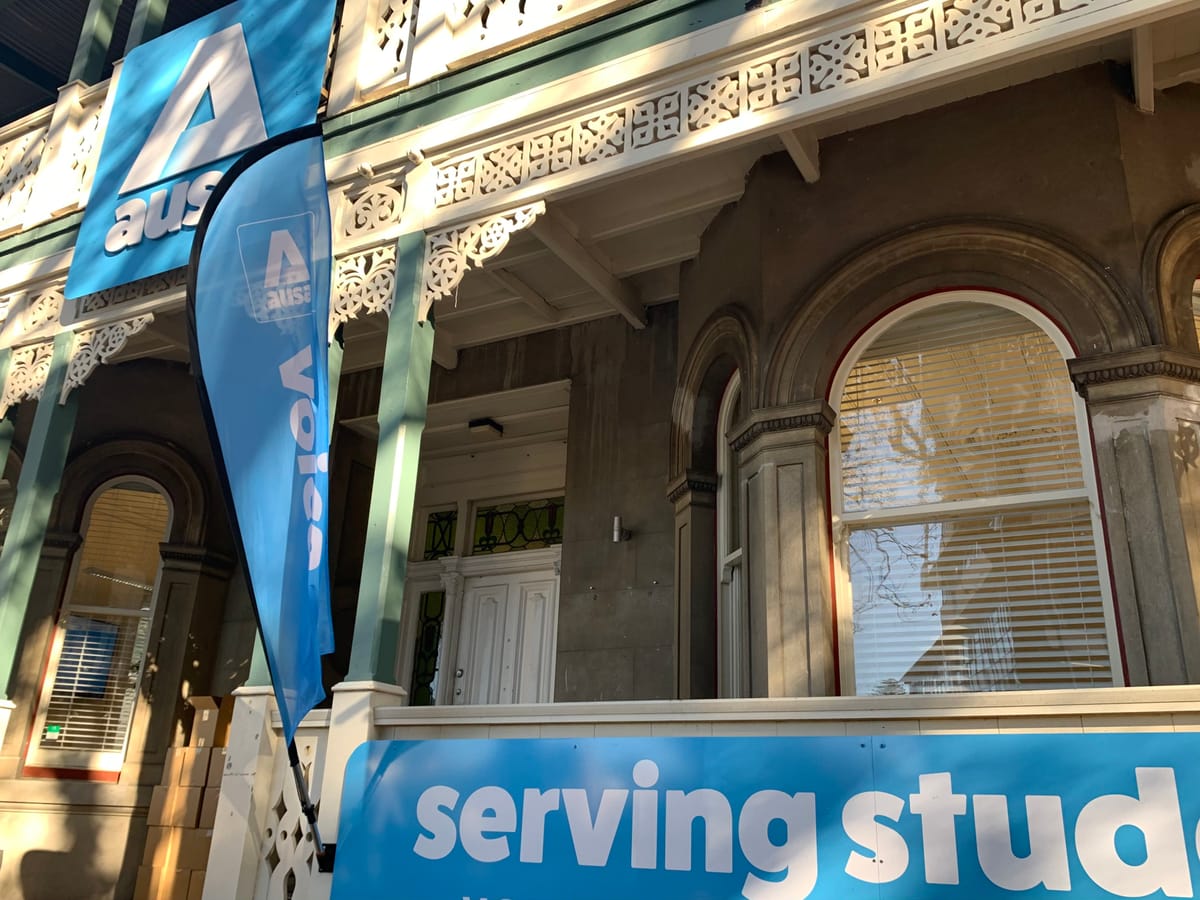AUSA 2026 Candidate Debates: Undergraduate Education VP Edition
AUSA Election Debates Recap: Who is your next UEVP?

Disclaimer: Neither the author nor Craccum supports any specific groups or endorses any candidates within student politics. We strive to maintain impartiality in our reporting. All AUSA 2026 candidates have been given an equal opportunity to be interviewed.
We wouldn't blame you if this is the first time you've heard of the Education Vice-President role on the AUSA Executive. Apart from the AUSA Presidential candidates, the other portfolios arguably receive far less recognition, and perhaps with that, lesser voter scrutiny. But this Craccum contributor has her sights on galvanizing you to vote in the AUSA elections this year, and part of that mission includes highlighting the portfolio which encompasses our 'primary' reason for being here: education.
The AUSA website states:
The Education Vice-President (Undergraduate) (UEVP) is AUSA’s undergraduate representative on various academic decision-making bodies. The Education VP’s job is to voice the concerns and ideas of students to the University, often providing student feedback on consultations taking place across the University specific to the undergraduate student body. The Education Vice-President (Undergraduate) works closely with the AUSA Student Council, regularly engaging with our Faculty and School Associations.
This year, your UEVP candidates are Matthew Lee, Josiah Fresnel, Amulya Aggarwal, and Yaohua Zuo (in absentia). Their candidate debate touched on a myriad of academic and broader social issues concerning students, from AI policies, barriers to on-campus learning, and more inclusive assessment formats.
Matthew Lee
Matthew Lee is a returning candidate for the UEVP portfolio, having been voted into the 2025 AUSA Executive. Lee is determined to build on his current progress, citing the importance of championing student voice as we approach the tumultuous General Elections next year.
When queried about the most pressing academic issue on campus, Lee immediately stated, "AI is here to say," calling for clearer university guidelines to regulate the use of AI in future coursework and assessments. He also proposed new policies expanding the portfolio of class reps, emphasising their unique position as the "most direct form of representation students have." His policy reforms would see targeted improvements to the current class rep training program, including creating greater opportunities for volunteers to upskill and leverage new competencies by taking on the role.
Perhaps, it would be beneficial to dispel the idea that 'having another line on your CV' is all being a class rep is good for. But how feasible are these policies? Did they risk making the role cumbersome for unpaid volunteers? Lee makes the point that class reps are often highly engaged people to begin with, and that his policies aim to provide volunteers with greater incentives, so the role is more rewarding and career-enhancing overall.
Since starting the position, Lee has also been a staunch advocate for student voice, rallying for AUSA to make bold statements on student issues and being more involved in grassroots advocacy. He promises to continue speaking up, recounting the 2025 AUSA Executive's statement on The Crimes Legislation (Stalking and Harassment) Amendment Bill and how they adapted their recommendations for submissions to Parliament, necessarily incorporating people's own experiences of stalking on campus.
In another candid discussion about student engagement, Lee drew attention back to the 'Open House' project implemented by the 2025 AUSA Executive. The initiative saw AUSA Execs hosting monthly or fortnightly public meetings around campus, whereby students can interact with their representatives and voice any pressing concerns. He acknowledges that while the initiative was effective for students already engaged on campus, establishing rapport and strengthening outreach with new groups on campus had proven more difficult.
We've thought about different ways to do it, but it's quite a difficult thing, and it requires more than just this year.
Josiah Fresnel
Josiah Fresnel is a first-time candidate in the AUSA elections but has previously been active as a long term student campaigner on campus. A bold advocate for the International Socialist Organisation (ISO), Fresnel seeks to revitalise the student movement and restore the former glory of AUSA as a champion for student voice and radical change. He believes the UEVP role exceeds beyond the confines of formal education, citing all the social barriers depriving students of equitable outcomes in university.
"We're not just robots who come to university to spit out essays and exams and then go home. We live in a world and we're humans."
Fresnel identifies the cost of transport, rentals, and food as the biggest issues faced by students today. When pressed on how these issues necessarily translated into academic concerns, he maintained that all these non-negotiables were crucial for university learning, omitting further elaboration.
One initiative proposed by the pro-socialist candidate was a textbook recycling service, where students finishing a course could sell their textbooks to AUSA, which would then resell them to other students the following semester. This idea follows from the imminent liquidation of the university bookstore: UBIQ. He acknowledged that students will still need to purchase new textbooks from time to time, and the closure leaves students with fewer options for buying and selling course materials.
For Fresnel, the undergraduate education portfolio requires him to remain non-partisan and represent the interests of all undergraduate students. One might wonder, how can an openly socialist candidate fulfil that role? Fresnel's response is simple. No one, regardless of whether they claim to be political or apolitical, can perfectly represent thousands of students on campus. He declared that AUSA was not a functioning democracy, with only 10%~ of the student population voting each year. His ideal student association would prioritise political accountability and being authentically representative of student interests. He highlights important democratic functions, such as calling special general meetings (SGMs), proposing constitutional amendments, hosting well-advertised and strategically positioned public meetings–"so that each student has an equal vote in deciding what the policy and the constitution of AUSA looks like."
Amulya Aggarwal
Amulya Aggarwal spoke and delivered her main points in a calm and collected fashion, indicating a self-assured and matter-of-fact candidate ready to take charge.
Aggarwal recounted her prior experiences as a Faculty Representative whereby she partook in multiple faculty-wide meetings determining various education policies in the University. As a Faculty Representative, she was able to track the live merging of the Arts and Education faculties, witnessing crucial decisions about how different programs were grouped under new sub-faculties. Aggarwal emphasises her commitment to ensuring stronger transparency in decision-making affecting students, especially by enumerating which student considerations inform any final decisions reached.
Working towards more inclusive assessments was another top priority for Aggarwal. She argued that mātauranga Māori approaches must be embraced, with more intentional efforts made to subvert the traditional Western notion of 'objectivity'.
"The current assessments are inclusive in terms of maybe some extra time, or a room with maybe less students, but there are cognitive impairments and different experiences that students bring to the table."
Aggarwal addressed the issue of unaffordable transportation costs by focusing on measures the university could take, rather than broader council or government solutions raised by other candidates. Aggarwal proposes hybrid modes of attendance to ensure all students receive the opportunity to receive credit for attending classes and engaging with their peers, despite not coming to campus. When queried about how her proposal was distinct from current lecture recordings on Panopto Video, she explained developing more online tutorial formats, which could count towards attendance credit.
So, there you have it, a brief explainer on what your UEVP candidates had to say at this year's AUSA candidate debates. To have your say on who ends up on next year's AUSA Executive, make sure to vote by Friday, 29th August.
Vote here: https://ausa.org.nz/elections/voting/

Craccum would like to humbly thank the Arts and Education Student Association (AESA) for their commitment to platforming all student campaigns in this year's AUSA elections.
Disclaimer: The views and opinions expressed in Craccum are those of individual contributors and interviewees and do not necessarily reflect those of the editorial team or the publication as a whole. While we aim to ensure accuracy and fairness, Craccum cannot guarantee the complete reliability of all information presented and assumes no liability for errors or omissions.





